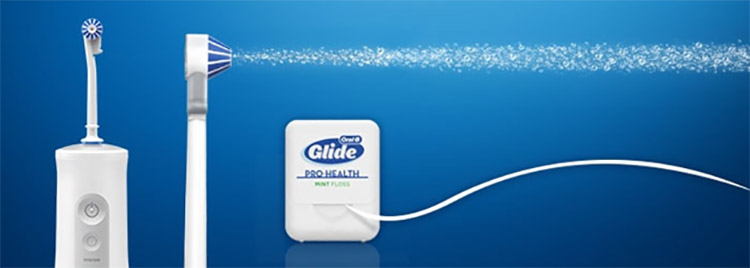Are Water Flossers Effective?

Table of Contents
Are Water Flossers Effective?
Water flossers, or oral irrigators, use a pressurized stream of water to clean teeth and gums, but do water flossers really work when it comes to your oral health? When combined with a complete, daily oral hygiene routine, a water flosser can help reduce plaque buildup and remove more food particles that can get trapped in tight spaces. The Oral-B Water Flosser Advanced is dentist-inspired to deep clean and detoxify below the gum line* as it targets and helps eliminate plaque bacteria for healthier gums and cleaner teeth.
Are Water Flossers a Replacement for Standard Dental Floss?
Water flossers are generally effective at reducing plaque buildup; however, they should not replace regular daily flossing. Rather, the two should be used together to ensure you get a more complete clean.
What are the Benefits of the Oral-B Water Flosser?
When part of a complete oral care routine, a water flosser, like the Oral-B Water Flosser Advanced, can help wash away leftover food debris and reduce plaque buildup from hard-to-reach areas in the mouth. Unlike other irrigator options, the Oral-B Water Flosser Advanced features unique Oxyjet Technology to target and help eliminate plaque bacteria for healthier gums. Plus, it includes three customizable streams and intensity modes for a more personalized clean while delivering a mess-free experience.
How to Use a Water Flosser
Used after brushing and traditional flossing, a water flosser can wash away remaining food in hard-to-reach places. Learn how to use a water flosser to get the most out of your daily oral hygiene routine.
From Oral-B, the #1 dentist-recommended floss brand†.
*Helps reduce plaque bacteria and inflammatory components associated with gingivitis, when used as an adjunct to brushing, flossing and regular professional care.
†Based on surveys conducted between November 2018 and June 2020 and confirmed to be statistically significant at a 95% confidence level by Radius Illumination, September 25, 2020.
Sources
- https://www.healthline.com/health/dental-and-oral-health/waterpik-vs-flossing#waterpiks
- Kantar.https://www.mayoclinic.org/healthy-lifestyle/adult-health/expert-answers/dental-floss/faq-20058112
- https://www.verywellhealth.com/is-water-flossing-better-than-string-flossing-4137725
- https://www.webmd.com/oral-health/what-is-waterpik#1
Table of Contents
- Are Water Flossers Effective?
- Are Water Flossers a Replacement for Standard Dental Floss?
- What are the Benefits of the Oral-B Water Flosser?
-
- Sources

Sign Up
for expert advice and exclusive offers

Sign Up
for expert advice and exclusive offers
